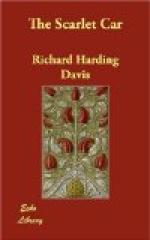As through the window of an express train, Mr. Schwab saw the white front of Claremont, and beyond it the broad sweep of the Hudson. And, then, without decreasing its speed, the car like a great bird, swept down a hill, shot under a bridge, and into a partly paved street. Mr. Schwab already was two miles from his own bailiwick. His surroundings were unfamiliar. On the one hand were newly erected, untenanted flat houses with the paint still on the window panes, and on the other side, detached villas, a roadhouse, an orphan asylum, a glimpse of the Hudson.
“Let me out,” yelled Mr. Schwab, “what you trying to do? Do you think a few blocks’ll make any difference to a telephone? You think you’re damned smart, don’t you? But you won’t feel so fresh when I get on the long distance. You let me down,” he threatened, “or, I’ll——”
With a sickening skidding of wheels, Winthrop whirled the car round a corner and into the Lafayette Boulevard, that for miles runs along the cliff of the Hudson.
“Yes,” asked Winthrop, “What will you do?”
On one side was a high steep bank, on the other many trees, and through them below, the river. But there were no houses, and at half-past eight in the morning those who later drive upon the boulevard were still in bed.
“What will you do?” repeated Winthrop.
Miss Forbes, apparently as much interested in Mr. Schwab’s answer as Winthrop, leaned forward. Winthrop raised his voice above the whir of flying wheels, the rushing wind and scattering pebbles.
“I asked you into this car,” he shouted, “because I meant to keep you in it until I had you where you couldn’t do any mischief. I told you I’d give you something better than the Journal would give you, and I am going to give you a happy day in the country. We’re now on our way to this lady’s house. You are my guest, and you can play golf, and bridge, and the piano, and eat and drink until the polls close, and after that you can go to the devil. If you jump out at this speed, you will break your neck. And, if I have to slow up for anything, and you try to get away, I’ll go after you—it doesn’t matter where it is—and break every bone in your body.”
“Yah! you can’t!” shrieked Mr. Schwab. “You can’t do it!” The madness of the flying engines had got upon his nerves. Their poison was surging in his veins. He knew he had only to touch his elbow against the elbow of Winthrop, and he could throw the three of them into eternity. He was travelling on air, uplifted, defiant, carried beyond himself.
“I can’t do what?” asked Winthrop.
The words reached Schwab from an immeasurable distance, as from another planet, a calm, humdrum planet on which events moved in commonplace, orderly array. Without a jar, with no transition stage, instead of hurtling through space, Mr. Schwab found himself luxuriously seated in a cushioned chair, motionless, at the side of a steep bank. For a mile before him stretched an empty road. And, beside him in the car, with arms folded calmly on the wheel there glared at him a grim, alert young man.




